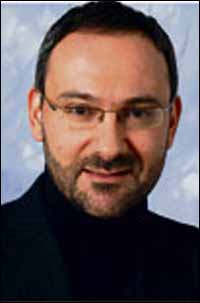|
PROFILE Emanuele ran a US think-tank... from his home in Brussels | |
IT'S funny how a person's earliest memories can influence their choice of career.
From an early age Emanuele Ottolenghi's family discussed politics around the dinner table. And, more than 30 years later, the Italian is a political scientist and an expert in his field. He is currently the senior fellow with the Foundation for the Defense of Democracies in Washington DC. But there is no need for him to reside in America. He is perfectly content living in Brussels with his wife and two children. For it was in Belgium that Emanuele ran the American Jewish Committee's think tank The Transatlantic Institute. "Politics is my life-long passion," Emanuele, 42, told the Jewish Telegraph. "I was active in political youth movements at high school and in college." He hails from the northern Italian city of Bologna - and grew up in an extremely small community of around 200 Jews. "My family has been in Italy for at least five centuries," said Emanuele, the youngest of three brothers. "Although my family assimilated into Italian society during the 19th century, there was sometimes a lingering prejudice against me which manifested itself on occasion. "There were comments from schoolmates at times, and then sometimes antisemitism in the newspapers and from the Catholic Church. "There were stereotypes from the fascist era and the communist newspapers were strongly anti-Israel." There are around 32,000 Jews in Italy, most of them centred in communities in the northern and central parts of the country. "When the Spanish Inquisition happened, many of the Jews in southern Italy were also kicked out," Emanuele explained. "Even now in Sicily you will find a lot of names, such as Lopez and Pinto which are Sephardic, but these people are not Jewish." But he claims that Jewish and Italian cultures can merge and that they reinforce each other. Both cultures consider family to be of the utmost importance, both love their food and both can be known for their boisterous and opinionated nature. The first Jewish ghetto was established in Venice in the 16th century and the Papal States expelled its Jews. Emanuele explained that the majority of Italian Jews are neither Ashkenazim nor Sephardim. "Certainly in the case of the Jews in Rome, their origin goes back to Roman times when the first Jewish settlement occurred during the War of the Maccabees," he said. "The Maccabees sent ambassadors to Rome." It wasn't always easy to maintain a Jewish way of life in Bologna, however. Emanuele recalled: "We were not strictly observant, that is certainly difficult in a city with only 200 Jews. "For many years we didn't have a permanent rabbi, but I did celebrate my barmitzvah and we went to the synagogue every Shabbat and we had kiddush every Friday night and Saturday. "I learned to lehen for my barmitzvah - it was all part of my Jewish education. "Israel-wise, my parents were always very pro and it was something that was always on our minds. "The Italian Jewish community tends to be very Zionist - even its Orthodox rabbonim." Italy's relationship with Israel hasn't always been smooth, either. But, Emanuele explained, it has been a lot friendlier under the government of the irascible Silvio Berlusconi. "In the past, Italy had to temper its friendship with Israel in order to maintain a friendship with the Arab world - it involved oil interests," he said. Emanuele attended Bologna University before moving to Israel and earning a PhD from Jerusalem's Hebrew University. His adventures continued when he headed to England and taught at the Middle East Centre of St Anthony's College, Oxford, and at the Oxford Centre for Hebrew and Jewish Studies. "I think that much of the Diaspora looks up to the UK Jewish community," he continued. "Organisations such as the Community Security Trust and Limmud are two of the best products that UK Jewry has produced." Emanuele spent eight years in Oxford before moving to Belgium. He has since written about the Middle East and antisemitism for various newspapers, including The Guardian, Newsday and the Middle East Quarterly, as well as Italian newspapers Il Corriere del Ticino, Il Foglio and Libero. Emanuele has also penned three books, two on Iran and one on antisemitism. And he has his own view on the Iranian threat, especially its development of nuclear weapons. "Israel has its own understandable reason to be fearful - do not underestimate the Iranian threat," Emanuele added. "Iran has a history of aggressive behaviour, driven by an ideology that is unequal to freedom, confrontational and antagonistic." Emanuele is currently working on a monograph, for the Foundation for the Defense of Democracies on Iran's feared Revolutionary Guards. "The Israelis are in a position to make a judgement - the possibility of an attack on Iran is on the cards, but they are not rushing to do so." Brussels is home to the European Union and NATO and seems a perfect fit for Emanuele. "It is politically very interesting here," he explained. "The Jewish community is not as big as the UK but it is bigger then the community I grew up in and more diverse. "There is everything from a North African Sephardic synagogue to the Orthodox Ashkenazi shtetl-style synagogue to Liberal Judaism and everything in between. It is certainly lively." Emanuele also hosts his own show on Radio Judaica, which is broadcast from Brussels. www.radiojudaica.com and www.defenddemocracy.org
|
